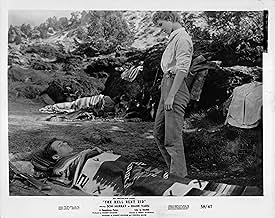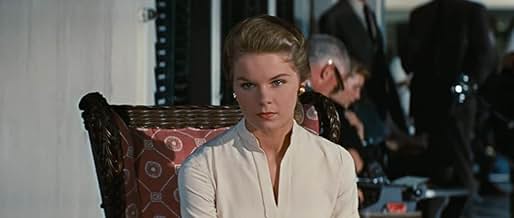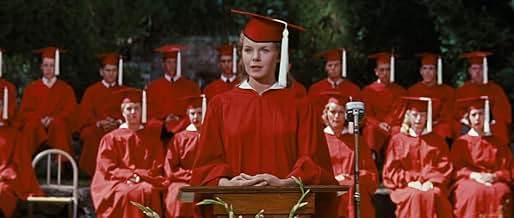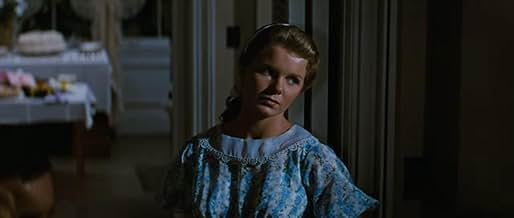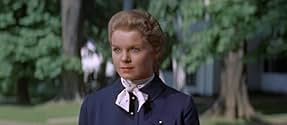Diane Varsi(1938-1992)
- Actress
This lovely, long-haired, fresh-faced and most promising product of the
late 1950s was born Diane Marie Antonia Varsi in San Mateo, California,
on February 23, 1938, the elder of two daughters of Russell Varsi, a
florist, and wife Beatrice DeMerchant. A troubling childhood led to her
dropping out of high school, toiling instead in a number of nowhere
jobs -- waitress, dress shop model, fruit picker, candle dipper, etc.
An intended spiritual sojourn in the mid-1950s from San Francisco to Mexico ended when she got as far as Los Angeles. A sensitive soul, Diane settled there and became interested in the fine arts, including folk singing, dancing, acting, writing poetry and music. She enrolled in actor Jeff Corey's acting classes and debuted in a community theater production of "Gigi." After a brief marriage that was annulled, Diane met and married producer James Dickson, who became her manager. A son Shawn Michael was born.
Through her contact with actor Corey, Diane was given the chance to audition for director Mark Robson for a part in the film version of the best-selling novel Peyton Place (1957). Despite the studio's objections, she was chosen by Robson over hundreds of others, despite her lack of experience, and made an auspicious debut in the coveted role of Allison MacKenzie. A critical hit as well as a box-office smash, Diane was nominated for an Academy Award ("Supporting Actress") along with fellow Peyton performers Lana Turner, Arthur Kennedy, Hope Lange and Russ Tamblyn, not to mention director Robson. Included in its nine nominations total was a "Best Picture" nod. She also shared a Golden Globe for "Most Promising Newcomer" with actresses Sandra Dee and Carolyn Jones. Despite the movie's shut-out at the Academy Awards ceremony, Diane was deemed a new and exciting star while columnist Louella Parsons went on to call her "Hollywood's Female Brando." A rebel and non-conformist by nature who had a difficult time with celebrity, she was compared to the late James Dean in her tendency to withdraw and avoid publicity.
After Peyton Place, Diane appeared in three more high-profile Twentieth Century-Fox productions -- From Hell to Texas (1958), a western directed by Henry Hathaway and co-starring Don Murray; Ten North Frederick (1958), featuring her as Gary Cooper daughter; and the lead female role in Compulsion (1959) based on the Leopold-Loeb murder case. All of these placed Diane in the top ranks of young new actresses, but she found it harder and harder to cope with the pressures of the studio system. She eventually suffered a nervous collapse. Unable to readjust to the pressures, she started to habitually turn down roles in important movie scripts. Eventually Fox suspended her.
In March of 1959, Diane abandoned Hollywood, divorcing her husband in the process, and moved with her son to Vermont, away from the limelight. Returning to her Bohemian lifestyle of poetry and solitude, she was still recognized. Within a couple of years Diane moved back to California. Marrying producer named Michael Hausman, she had with him a second child, daughter Willo, who later had a minor acting career under the name Willo Hausman.
Still barred from working at any studio by Fox, her contract finally expired in late 1964, and she became available again. The work was hardly in the same caliber as her earlier feats. Former co-star Don Murray helped her get a role in his low-budget film entitled Sweet Love, Bitter (1967), and a role in a Swedish film entitled Roseanna (1967), but it all led to nowhere.
In 1968 Diane Varsi began an association with American International Pictures and filmed the cult flick Wild in the Streets (1968) with the equally rebellious Christopher Jones playing a drugged-out politico. She also co-starred in a third-rate Bonnie and Clyde tale called Killers Three (1968). In 1969, she was featured with Robert De Niro and Bruce Dern in Roger Corman's Bloody Mama (1970) with Diane playing a hooker and a deranged Shelley Winters reenacting murderous Ma Barker. She also played roles that spoke to her, such as the nurse in the anti-war film Johnny Got His Gun (1971) and her part in the TV-movie The People (1972), about peaceful aliens invading the earth. A sprinkling of other TV assignments also came her way.
The writing was on the wall, however, for Diane. The dust had settled on what was the remnants of a once glorious career. After turning in a small role as an overweight mental patient in the excellent film I Never Promised You a Rose Garden (1977), Diane again dropped out of sight--this time for good. Little was heard although it was said she had returned to her poetry and took up photography. The newspapers reported her death on November 19, 1992, in Los Angeles at age 54, from respiratory problems due to complications from Lyme disease, which she had contracted back in 1977.
An intended spiritual sojourn in the mid-1950s from San Francisco to Mexico ended when she got as far as Los Angeles. A sensitive soul, Diane settled there and became interested in the fine arts, including folk singing, dancing, acting, writing poetry and music. She enrolled in actor Jeff Corey's acting classes and debuted in a community theater production of "Gigi." After a brief marriage that was annulled, Diane met and married producer James Dickson, who became her manager. A son Shawn Michael was born.
Through her contact with actor Corey, Diane was given the chance to audition for director Mark Robson for a part in the film version of the best-selling novel Peyton Place (1957). Despite the studio's objections, she was chosen by Robson over hundreds of others, despite her lack of experience, and made an auspicious debut in the coveted role of Allison MacKenzie. A critical hit as well as a box-office smash, Diane was nominated for an Academy Award ("Supporting Actress") along with fellow Peyton performers Lana Turner, Arthur Kennedy, Hope Lange and Russ Tamblyn, not to mention director Robson. Included in its nine nominations total was a "Best Picture" nod. She also shared a Golden Globe for "Most Promising Newcomer" with actresses Sandra Dee and Carolyn Jones. Despite the movie's shut-out at the Academy Awards ceremony, Diane was deemed a new and exciting star while columnist Louella Parsons went on to call her "Hollywood's Female Brando." A rebel and non-conformist by nature who had a difficult time with celebrity, she was compared to the late James Dean in her tendency to withdraw and avoid publicity.
After Peyton Place, Diane appeared in three more high-profile Twentieth Century-Fox productions -- From Hell to Texas (1958), a western directed by Henry Hathaway and co-starring Don Murray; Ten North Frederick (1958), featuring her as Gary Cooper daughter; and the lead female role in Compulsion (1959) based on the Leopold-Loeb murder case. All of these placed Diane in the top ranks of young new actresses, but she found it harder and harder to cope with the pressures of the studio system. She eventually suffered a nervous collapse. Unable to readjust to the pressures, she started to habitually turn down roles in important movie scripts. Eventually Fox suspended her.
In March of 1959, Diane abandoned Hollywood, divorcing her husband in the process, and moved with her son to Vermont, away from the limelight. Returning to her Bohemian lifestyle of poetry and solitude, she was still recognized. Within a couple of years Diane moved back to California. Marrying producer named Michael Hausman, she had with him a second child, daughter Willo, who later had a minor acting career under the name Willo Hausman.
Still barred from working at any studio by Fox, her contract finally expired in late 1964, and she became available again. The work was hardly in the same caliber as her earlier feats. Former co-star Don Murray helped her get a role in his low-budget film entitled Sweet Love, Bitter (1967), and a role in a Swedish film entitled Roseanna (1967), but it all led to nowhere.
In 1968 Diane Varsi began an association with American International Pictures and filmed the cult flick Wild in the Streets (1968) with the equally rebellious Christopher Jones playing a drugged-out politico. She also co-starred in a third-rate Bonnie and Clyde tale called Killers Three (1968). In 1969, she was featured with Robert De Niro and Bruce Dern in Roger Corman's Bloody Mama (1970) with Diane playing a hooker and a deranged Shelley Winters reenacting murderous Ma Barker. She also played roles that spoke to her, such as the nurse in the anti-war film Johnny Got His Gun (1971) and her part in the TV-movie The People (1972), about peaceful aliens invading the earth. A sprinkling of other TV assignments also came her way.
The writing was on the wall, however, for Diane. The dust had settled on what was the remnants of a once glorious career. After turning in a small role as an overweight mental patient in the excellent film I Never Promised You a Rose Garden (1977), Diane again dropped out of sight--this time for good. Little was heard although it was said she had returned to her poetry and took up photography. The newspapers reported her death on November 19, 1992, in Los Angeles at age 54, from respiratory problems due to complications from Lyme disease, which she had contracted back in 1977.


